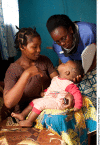Plausible role for CHW peer support groups in increasing care-seeking in an integrated community case management project in Rwanda: a mixed methods evaluation
- PMID: 25276593
- PMCID: PMC4168637
- DOI: 10.9745/GHSP-D-14-00067
Plausible role for CHW peer support groups in increasing care-seeking in an integrated community case management project in Rwanda: a mixed methods evaluation
Abstract
Background: The Kabeho Mwana project (2006-2011) supported the Rwanda Ministry of Health (MOH) in scaling up integrated community case management (iCCM) of childhood illness in 6 of Rwanda's 30 districts. The project trained and equipped community health workers (CHWs) according to national guidelines. In project districts, Kabeho Mwana staff also trained CHWs to conduct household-level health promotion and established supervision and reporting mechanisms through CHW peer support groups (PSGs) and quality improvement systems.
Methods: The 2005 and 2010 Demographic and Health Surveys were re-analyzed to evaluate how project and non-project districts differed in terms of care-seeking for fever, diarrhea, and acute respiratory infection symptoms and related indicators. We developed a logit regression model, controlling for the timing of the first CHW training, with the district included as a fixed categorical effect. We also analyzed qualitative data from the final evaluation to examine factors that may have contributed to improved outcomes.
Results: While there was notable improvement in care-seeking across all districts, care-seeking from any provider for each of the 3 conditions, and for all 3 combined, increased significantly more in the project districts. CHWs contributed a larger percentage of consultations in project districts (27%) than in non-project districts (12%). Qualitative data suggested that the PSG model was a valuable sub-level of CHW organization associated with improved CHW performance, supervision, and social capital.
Conclusions: The iCCM model implemented by Kabeho Mwana resulted in greater improvements in care-seeking than those seen in the rest of the country. Intensive monitoring, collaborative supervision, community mobilization, and CHW PSGs contributed to this success. The PSGs were a unique contribution of the project, playing a critical role in improving care-seeking in project districts. Effective implementation of iCCM should therefore include CHW management and social support mechanisms. Finally, re-analysis of national survey data improved evaluation findings by providing impact estimates.
Figures



References
-
- Marsh DR, Hamer DH, Pagnoni F, Peterson S. Introduction to a special supplement: evidence for the implementation, effects, and impact of the integrated community case management strategy to treat childhood infection. Am J Trop Med Hyg. 2012;87(5 Suppl): 2–5 10.4269/ajtmh.2012.12-0504 - DOI - PMC - PubMed
-
- Ministry of Health (MOH) [Rwanda]. Community health workers trainers guide: “community integrated management of child illness.” Kigali (Rwanda): MOH; 2011
-
- Mugeni C, Ngabo F, Humuza J. Community performance-based financing in health: incentivizing mothers and community health workers to improve maternal health outcomes in Rwanda. Draft background paper for the World Conference on Social Determinants of Health. Geneva: World Health Organization; 2011. Available from: http://www.who.int/sdhconference/resources/draft_background_paper20_rwan...
-
- National Institute of Statistics of Rwanda (NISR) [Rwanda]; Ministry of Health (MOH) [Rwanda]; ICF International. Rwanda demographic and health survey 2010. Calverton (MD): NISR; 2012. Co-published by the MOH and ICF International. Available from: http://dhsprogram.com/pubs/pdf/FR259/FR259.pdf
-
- World Health Organization (WHO); Organization for Economic Cooperation and Development (OECD). Official development assistance for health to Rwanda. Geneva: WHO; 2012. Available from: http://www.who.int/gho/governance_aid_effectiveness/countries/rwa.pdf
Publication types
MeSH terms
LinkOut - more resources
Full Text Sources
Other Literature Sources
Medical
